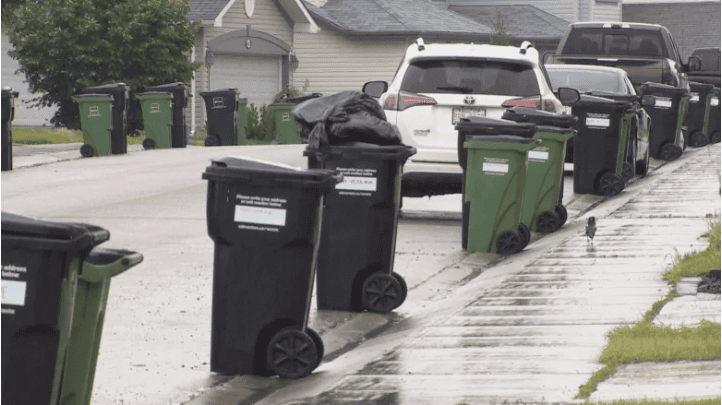
Of the 8,000 households in the organics pilot, only 13 have refused to participate
If the future of waste efficiency in Edmonton is in the hands of its residents, the first few months of an organics pilot project bodes well.
City councillors agreed to a revamped strategy Thursday with the eventual goal of keeping 90 per cent of its residential garbage out of the landfill.
The strategy depends, in large part, on the effort and accuracy of residents separating organics from garbage and recyclables.
A pilot project testing the system is in its third month, with 8,000 households in a dozen neighbourhoods taking part.
Only 13 homes have refused to participate in the system, city administration told CBC News Friday.
Neighbourhoods on the northside participating include Baturyn, Beacon Heights, Brintnell, Cy Becker, Chambery, Delwood, Miller, and Kensington.
In the south, Ellerslie, Forest Heights, Kiniski Gardens, Satoo, and Tamarack are in the pilot.
Karl Kuss lives in Beacon Heights and is partaking in the pilot. He said overall, the system is working and separating has helped cut his garbage in half.
“It has cut back significantly on our regular waste. It’s amazing.”
Kuss said he and his wife are putting out one to two garbage bags every two weeks, instead of two or three every week. “I feel we’re on the right track,” Kuss said of the separation program.

“When I looked at the rest of the world and I looked at the rest of the country, we were a little bit behind the times,” he said. “We have to get with the times.”
In the pilot, residents put organics like food scraps and used paper towels in green bins, which are picked up once a week in the summer and every other week in the winter.
Garbage in the black bins gets picked up every other week.
Trucks with automated arms lift the bins and dump the contents into trucks.
Many Canadian jurisdictions have been source-separating for several years. In Edmonton, it wasn’t necessary under the former waste system, which processed all materials at the waste management centre.
Fatima Fernandez, a resident of Brintnell, admits it takes a bit of time to get the hang of it.
“Once you get started, it becomes easy,” she said. “At first, you feel a little flustered, not knowing what to put in there.”
The city handed out brochures outlining what goes into the different bins and blue bags. Fernandez said the city’s website and an app called WasteWise helps outlines the parameters.
“I wasn’t sure if I could actually at first put the coffee filters in the compost, cause I didn’t know if the filters were compostable but they are.”
Kuss still has a few concerns: one is the tiny bin for kitchen scraps that won’t be sufficient, especially on holidays.
He notes other jurisdictions have bigger kitchen bins for scraps.
Kuss is also concerned the organics will invite unwanted critters.
“Rodents just love to find their way into things,” he said. “I’m an old farm boy, we used to have feed in garbage cans with good tight lids on it, and every once in a while you’d open them up and guess what was inside? A half a dozen mice.”
Changes coming
When the program was rolled out, the city asked participants to refrain from using biodegradable plastic bags, commonly found in other jurisdictions.
They’re supposed to use paper bags or nothing to line their bins.
Vahid Rashidi, senior project engineer in waste services, said the city will soon allow participants to use biodegradable plastic bags.
“It is a concern that we’ve heard loud and clear from the residents,” he said Friday.He suggested people layer the green cart with shredded paper, newspaper, used paper towels or grass to help mitigate odours.

“It’s a path of education, it’s a path of learning, it’s a path we’re on,” he said Friday. “It’s definitely always improving.”
The pilot has generated nearly a thousand tonnes of organic matter since it started in April.
Since the city shut down the compost facility earlier this spring, some of the organics were sent to the city’s anaerobic digestion facility, which is still in test mode.
When fully operational, the ADF — a method of breaking down organics without oxygen — is expected to process about 45,000 tonnes.
For now, the city will get a third-party company to process small amounts of organics generated from the pilot.
The city is exploring partners in composting to handle more organics when the pilot turns into a city-wide program next summer.
Another 250,000 single households will join these neighbourhoods in separating the food from the chaff.


